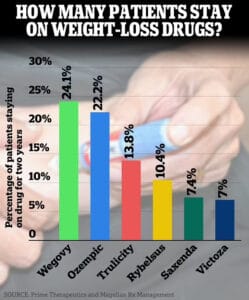What is Ozempic?
Ozempic and Wegovy (Semaglutide) are injectable drugs granted approval in the US for Type 2 Diabetes (T2D) in 2017. This means that it was originally used as an anti-diabetes medication. However, a by-product of the medication was found to be weight loss. After that, the focus of the drug switched from diabetes treatment to weight loss. In 2023, Semaglutide was approved in the UK as an anti-obesity drug for those with a BMI (Body Mass Index) over 35. It was also approved for those with a BMI of 30-35 if they also had a weight related co-morbidity such as high blood pressure, heart disease or T2D.
Semaglutide’s reputation as a miracle weight loss drug skyrocketed due to positive publicity from Elon Musk and Boris Johnson. Elon Musk is pro semaglutide. Boris Johnson is not but only because it did not make him feel well. Semaglutide is now freely “prescribed” off label for those who want to lose a few pounds rather than those for whom it was originally intended. Basically, Semaglutide is now available to anyone who wants it and with the money to pay for it – in other words, it has become the magic bullet for weight loss and how to get slim.
How does Semaglutide work?
Semaglutide is a glucagon-like peptide-1 receptor agonist (GLP-1 RA). It mimics the action of the GLP-1 hormone in the body and is naturally secreted in your small intestine and colon when you eat, to control blood sugar. Semaglutide works by increasing insulin secretion in response to meals, by reducing the release of glucagon, slowing down gastric emptying (or gastric motility) and reducing the amount of glucose produced by the liver. In a nutshell, it can stabilise your blood sugar and make you feel fuller for longer. Semaglutide is a long-acting analog of GLP-1 with a plasma half-life of 160 hours which basically allows the drug to be administered once weekly as an injectable drug. The effect of Semaglutide is to keep the GLP-1 hormone (mimic) in circulation for seven days.
Enthusiasm trumps Evidence
There are many who question the long-term safety of keeping GLP-1 in circulation for seven days. Dr Michael Murray states on his website that the GLP-1 hormone is only naturally in circulation in the body for about two minutes. The effect of Semaglutide then is to keep the GLP-1 hormone in circulation for seven days rather than two minutes. What are the long-term health effects of artificially and drastically increasing the GLP-1 hormones time in circulation? No-one knows. And yet the UK Government is proposing to prescribe these drugs to children and the long term unemployed. Are we playing with fire?
Even now, with this explosion of interest and uptake in the drug, information on the long-term effects are limited. What we do know are the reported side-effects being experienced by new users. In June 2023, Professor Tim Spector tweeted “I’m hearing reports from the US of A & E doctors seeing patients on a daily basis having recently started on Ozempic injections for weight loss. Not only nausea but gut inflammation, proctitis, pancreatitis, vomiting, dehydration and delirium.” Other common side effects include constipation, diarrhea and pain including heartburn. Then there are “Ozempic burps” where food has been stagnating in the stomach, causing noxious gassy burps. Even Vogue began to report on “Ozempic Face” in 2023, in which it describes “Ozempic face can look gaunt, deflated and saggy. Think raisin as opposed to grape!”
What are the benefits of taking Semaglutide?
And there are also many benefits of taking this new wonder drug. The benefits include help with weight loss and weight maintenance in people with at least one weight-related medical condition. In one study, participants lost an average of 10% of their body weight after four years of taking Semaglutide. Semaglutide can help control blood sugar levels in people with type 2 diabetes. Semaglutide can also help reduce the risk of heart attack, stroke, or death in people with type 2 diabetes, obesity, and heart or blood vessel disease. In children, semaglutide can help prevent high blood sugar levels after meals, which can lower the risk of developing diabetes. Semaglutide may have anti-inflammatory effects, which could help reduce the risk of cardiovascular disorders. And finally, Semaglutide may help decrease addictive-like symptoms by altering the brain’s craving and reward drive.
But Semaglutide and other drugs like Ozempic must be taken consistently to see long-term weight loss effects. As soon as someone stops taking the drug, their body fat and former appetite tend to return.
Unintended Consequences
When the drug was first prescribed the dose was low to moderate. We now have what Dr Ben Bickman (see video below) refers to as “Wegovey/Ozempic dose” which is at a much higher level than first conceived. Glucagon suppression is achieved but at the higher dose now being taken, consequences have been activated that would not have been turned on at the lower dose. The unintended consequences include a change of rate in which food is moving through the intestine. When the GLP-1 hormone is dialled right up, peristalsis slows right down. Peristalsis is the natural process of smooth muscle moving digested food through the colon to the anus. But with higher dosages, food starts to hang around in the stomach for anything up to 24 hours which is four – five times longer than normal.
In fact, the food starts to rot in the stomach and ferment (causing Ozempic burps – see above) because the stomach is not designed to ferment food. This is the job of the colon. The long-term consequences of slowing down peristalsis are unknown however there are reported cases already where people taking Semaglutide have suffered gastroparesis and even lost peristalsis altogether.
Cancer Warning
The second issue is adipogenesis. Liraglutide, a forerunner of Semaglutide is known to activate adipogenesis which can stimulate the growth of new fat cells. It also may cause apoptosis which is the ability to interrupt the natural death and sloughing off of cells in the body. This is of concern where the cells are abnormal. Semaglutide already carries health warnings for cancer on the label.
Perhaps the question we should ask before embarking on this drug: are the consequences you want worth the consequences that you don’t?
What happens when you stop taking Semaglutide?
Research highlights that over 70% of individuals in the UK have actively chosen to stop taking Semaglutide within two years of use. When you stop taking Semaglutide without tackling any of the underlying issues that led you into insulin resistance, T2D or obesity, you will inevitably regain lost weight and often more. This is because Semaglutide reduces appetite but without the drug, the appetite returns. When you are taking the drug, the body is receiving the GLP-1 hormone at much higher doses than the body naturally produces, and this may suppress the body’s ability to produce GLP-1 on its own. Also, when you stop taking the drug, your body may be left in a GLP-1 deficit which may impact your satiety signal and allow you to eat more.
Starving Yourself
When you are taking Semaglutide many people report that they no longer feel hungry. They stop eating and do not take in sufficient calories which can put the brain and body into a starvation-like state. Your body will respond by increasing your hunger and appetite as well as your fat production. For those who struggle with eating disorders who have opted to take Semaglutide, this is going to hurt. Remembering too that over 70% of people have opted to stop taking Semaglutide within two years probably due to becoming heartily sick of the side-effects of the drug. This presents a dilemma: keep taking Semaglutide and keep losing weight or stop taking the drug and regain the lost weight. You choose.
Finally, when you lose weight this way, you will also be losing muscle which can make it harder in the long term to keep the weight off. Muscle burns more calories than fat. Losing muscle means you burn fewer calorie
Weight Regain
This means that for every 10kg of weight loss, 4 kg will be muscle and bone loss and six from fat. In fact, for many who stop taking the drug, the weight roars back on and especially for middle aged women. Yet his is the exact category of women who will struggle to build back lean muscle mass and bone density due to changes in hormone levels during and after menopause. The muscle mass and bone density will be gone forever – it is not easy to re-generate. Loss of muscle mass and bone density may cause osteoporosis and sarcopenia, two things that cause us so many problems in old age – having bones that will break easily and having no muscle strength to get up off the floor when we fall.
It also means that with the weight regain, you will be carrying more fat as a proportion of body mass than before even at the same body mass. This is because muscle burns more calories than fat so losing muscle mass means that you have inadvertently set yourself up to burn fewer calories.
How can Ozempic help with sugar and processed food addiction?
 Perhaps the best use of these weight loss drugs would be to combine the period when you are taking Ozempic with actively working with a recovery coach or better still, a coach who has experience in how to taper medications. Here the intention being to taper your dose and move towards a paleo/low carb or ketogenic food plan. Brendon Burchard has a great mantra which goes: first an intention then a behaviour then a habit then a practice then second nature then simply who you are – which in a sense is both the problem and the solution. But abstinence is not recovery. Learning new recovery skills and practising them with your recovery coach while you are being held and supported by Ozempic, may prove to be the best of both worlds.
Perhaps the best use of these weight loss drugs would be to combine the period when you are taking Ozempic with actively working with a recovery coach or better still, a coach who has experience in how to taper medications. Here the intention being to taper your dose and move towards a paleo/low carb or ketogenic food plan. Brendon Burchard has a great mantra which goes: first an intention then a behaviour then a habit then a practice then second nature then simply who you are – which in a sense is both the problem and the solution. But abstinence is not recovery. Learning new recovery skills and practising them with your recovery coach while you are being held and supported by Ozempic, may prove to be the best of both worlds.
Disease of Addiction
Human beings’ addictive tendencies are built around the consumption of carbohydrates. That combination of sweet and gooey or salty and crunchy – that’s always carbohydrate (maybe with or without fat) and it’s the effect of that consumption on our blood sugar that drives fat storage through insulin resistance. If you can get to the lowest possible effective dose and combine this with recovery and maintenance strategies, you will set yourself up for the best long-term outcome. Managing your macros matters most. Focus on controlling your glycaemic load and reducing the GI spikes.
Then, controlling your insulin will adjust your hunger and your weight loss will be stimulated naturally. Prioritise protein and never fear the fat that comes naturally with the protein. Proceed with caution but never alter a prescribed dose without consulting medical advice.
As Dr Ben Bickman says, the level of enthusiasm for these weight loss drugs outweighs and outpaces the evidence to date especially at the level of dosages being given. At some point there will be a reckoning, there always is and weight loss drugs have a poor track record.
Conclusion
The problem with a magic bullet is that aside from any unknown long term health risks, it doesn’t actually change your relationship with food. The same may be said for any weight loss diet : they do not teach you anything about how diet is affecting your mood, your thoughts, your compulsions or which foods are going to suit you best in the long term. Once the treatment stops be it a new diet or Ozempic use, the excess weight quickly reappears.
Most of us don’t have a clue what to eat to improve our health. The information is confusing and tends to adopt a one size fits all approach which is a very poor substitute for finding out what will nourish your body and make you feel strong and well. What you need is not a quick fix or a new diet, but a lifestyle change that is both healthy and sustainable. Weight loss is a by-product of good health. You need to find your personal formula, your best fuel mix – the one that makes you feel better as well as producing sustainable weight loss. Reduce inflammation and learn how to deal with stress and how to recover your natural rhythm and balance in this fast-paced modern world.
For more information watch this excellent interview with Dr Ben Bickman and Zoe Harcombe






